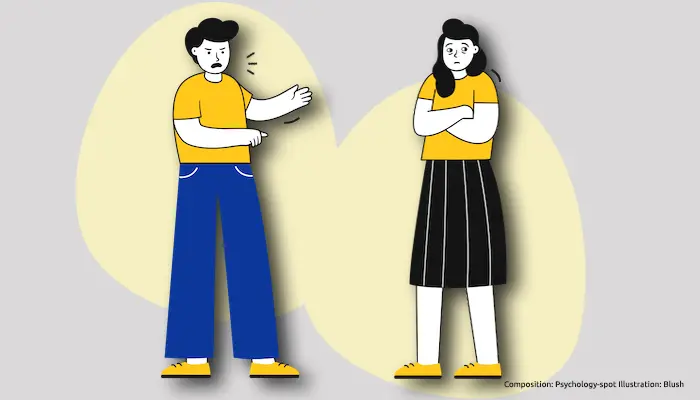
“I have four children, three little ones and one big one, my husband”, affirm some women. “I feel that I am the mother of my partner”, lament others.
It is not for less. A survey carried out a few years ago revealed that almost half of women admit that husbands stress out them 10 times more than their children.
Undoubtedly, biology and patriarchal society exacerbate the sense of motherhood. However, that is only part of the story. Treating the partner as if he/she were one more child is a complex phenomenon that goes far beyond gender to delve into the psychology of the person and the dynamics of the relationship. Understanding what is happening and stopping this tendency is essential so as not to sabotage the relationship.
Why does a person “adopt” his or her partner as a child?
There are many reasons that give rise to a parent-child relationship in the couple. In fact, there is often no single cause but rather a confluence of psychological factors:
1. Replicate a learned relational pattern. Many people end up trapped over and over again in the role of “parents” or “children” of their partners because they are replicating a relational pattern that they have learned. It is probable that this pattern comes from the relationship that their parents had. If one of your parents took on all the responsibilities at home or within the family and the other tended to behave in more immature and irresponsible ways, you may think that this is the normal dynamic between two people who love each other. You may think that it is natural for one to become the provider and caretaker while the other is subservient. If you’ve never questioned that pattern, you’re likely to use it as a template for maintaining your own relationships.
2. Establish a control dynamic that provides stability. People who have experienced a lot of uncertainty and instability or have suffered traumatic loss in the past may develop an anxious attachment style that leads them to try to control the other. Controlling each step that the partner takes, becoming their “fathers” or “mothers”, allows them to re-establish the feeling of security and stability that they so long for, avoiding re-experiencing the fear, sadness and pain of the past.
3. Keep afloat the relationship with a person who is too different. In some cases, the need to control or guide the other is the result of deep personal insecurity that stems from your partner’s decisions, attitudes, points of view or behaviors, which differ too much from your way of seeing the world. For example, if you are a very methodical, organized and responsible person, living with someone who is not can be a great challenge. In that case, to try to save the relationship, you can try to become the parent/secretary of your partner, organizing and directing his or her life since you think that his or her behavior and priorities are more like those of a small child than that of a mature adult. This generates a deep insecurity in you, which you try to compensate by controlling your life together.
Why shouldn’t you try to educate, correct or control your partner?
At the beginning, it is likely that the person who assumes the role of “father” or “mother” only wants to save the relationship and help the other to mature. With patience, he/she encourages him or her to make different decisions. “Maybe you should get up earlier so you can be on time.” “Maybe you should keep a list of your expenses so you can save.” “Maybe you could write down your commitments in the agenda so you don’t forget them”…
However, if the other person isn’t receptive to these suggestions, they quickly become reminders and later imperative commands. A “don’t forget to…” becomes a “you have to do…”.
At that point you have already become the “father” or “mother” of your partner. You have resigned yourself to assuming his or her responsibilities and you guide him or her as if were a small child. The problem is that this is the most direct path to dissatisfaction.
Sooner rather than later, the person who acts as “father” or “mother” will be overwhelmed by double work. He/she has to remember his or her commitments and those of the partner. Make decisions for both of you. Plan the future together. Dealing with his or her mistakes… And all that with minimal support.
On the other hand, whoever assumes the role of “son” will end up feeling controlled. At some point he/she will feel lacking psychological oxygen because he/she cannot be himself/herself. The imposition of tasks, responsibilities and even ways of seeing the world can end up blurring his/her personality, forcing him/her to follow a path that he/she would not have freely chosen.
This type of relationship configures a profoundly unequal power dynamic. In the long run, this relational dynamic generates frustration, resentment, and discontent. The “father” or “mother” imposes the rules and ensures that the “son” complies with them. This creates a dependency situation that may work for a while, but in the long run it is likely that the”child” decides to rebel or the “father” collapses under an excess of responsibilities.
How to break the roles of “mother” and “son” in a relationship?
When we start a relationship, we carry emotional baggage with us made up of beliefs, perspectives, expectations, values and past experiences. In fact, long before you started your current relationship, you already had a preconceived idea of what it should be like or how you should behave. Therefore, if you want to maintain a healthy and developing relationship for both, it is necessary to do an exercise in introspection.
The person who assumes the role of “father” or “mother” is usually a born caregiver. She/he enjoys taking care of others and shows her/his love by doing so. However, he/she is also usually a controlling person, very demanding and who believes that there is only one right way to do things. He/she generally views his/her partner as someone who needs to be cared for because he/she is irresponsible, helpless, and/or incompetent. That means you have a hard time respecting your partner’s boundaries or trusting him/her to do the right thing.
On the other hand, who assumes the role of “son” is usually more passive and could even enjoy that attention and care – at least at the beginning of the relationship. These are usually people who find it difficult to set limits and enforce them, so they generally resort to passive-aggressive behaviors. They often need a bit of order and security in their lives, but because they have trouble taking charge, they prefer to let others take care of it. However, in the long run they will begin to feel that their partner does not respect them, they will feel helpless in the relationship and they will begin to move away from it.
This means that in order to break the parent-child roles it is essential that each one look within themselves. It is usually easier to see the speck in the eye of others than the beam in your own, so it is likely that you concentrate on looking for explanations in the other’s defects to avoid the hard work involved in changing yourself.
Instead of focusing on the habits you don’t like in your partner, reflect on your expectations for that relationship. It may be true that you are the most mature and committed person, but perhaps you are also hoping that your partner will fit your mold. Perhaps you are trying to change the person next to you to fit your ideal or way of being.
Instead, remember that relationships are not to be judged but to be explored, understood, and appreciated. As a rule, the better you understand yourself, the better you can do the seemingly impossible: accept your partner for who he/she is, and not for what you want him/her to be.
It is likely that at some point you will also have to stop and reflect and ask yourself if that relationship is really worth saving or not. Think about what led you to that person. Sometimes, blinded by the pressure of day to day, you can forget that you share the same values or want the same things, even if you do not always agree on the path to follow to achieve them.
For this reason, it is important that you talk about your roles in the relationship, your expectations, the level of satisfaction and the way of conceiving life as a couple. Maybe you can come to an agreement. Maybe not. But surely both of you will mature as people.



